
Is keyword research still important for SEO? The answer to that question is a resounding yes!
Keyword research is the foundation of any SEO and SEM marketing campaign. Without it, SEOs, marketers, and webmasters might be blindly creating content without any real “business” justification.
In this article, you will learn 5 reasons why keyword research is important for SEO. At the end of the article, we’ll share some powerful keyword research tips that you can follow when doing your own keyword research.
What is Keyword Research?
Before we can establish why keyword research is important for SEO, we’ve first got to clearly define what keyword research is.
Keyword research is the process of discovering popular words and phrases that people are typing into a search engine in order to find the information they’re looking for.

Image source: Backlinko
For example, if you’ve got a personal training business, keyword research will help you discover keywords such as “men’s chest workouts”, “best exercises to lose fat”, etc.
Keyword research should be the first step that all webmasters and marketers follow when creating new content for a website or a client.
With that being said, let’s discuss why keyword research is important for any SEO marketing campaign.
Why is Keyword Research Important for SEO?
With so many different areas of SEO such as Core Web Vitals and backlinks, getting more public attention, it’s easy to forget about the importance of keyword research in SEO.
But here are 5 reasons why every SEO and marketer needs to prioritize keyword research when creating content or starting with a new SEO campaign.
Find What People are Searching for Online
When conducting keyword research, a content creator is able to get the inside scoop on what people are searching for online.
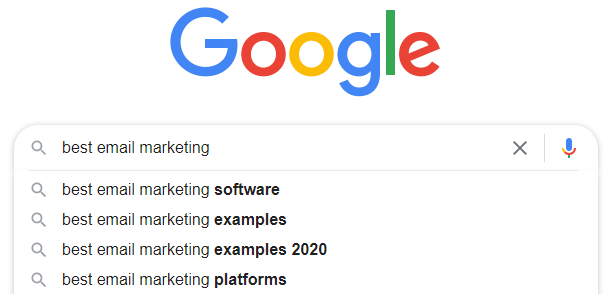
This information is vital because it gives content creators instant feedback on whether or not a content idea is worth spending time and resources on.
Essentially, you want to be creating content targeting keywords that people are already using to find information online. It’s no use you create content based on what you think your target audience is searching for.
Understand the Competitive Landscape
Keyword research allows SEOs to understand the competitive landscape by giving them a clear picture of who they’re competing against.
For instance, let’s say you’ve got an idea for a piece of content that you’d like to produce. By doing proper keyword research, you’ll be able to see which domains are already competing for the respective keyword(s).
Keyword research gives insights into how difficult or easy it will be to rank in the top spot in Google search and other search engines.
This leads us to the next reason why keyword research is important for SEO.
Identify Low Competition Content Opportunities
When conducting keyword research, you’ll be able to dig up content opportunities that have low competition.
By targeting keywords that have low competition, you’ll increase the odds of your content attracting more visitors and organic traffic to your website through search engines.
The opposite is also true, keyword research will reveal which keywords you should avoid targeting because of established domains already ranking for them.
Most keyword tools can be used to find low competition keywords and to sift out high competition keywords.
For example, let’s say you want to find content opportunities based on the keyphrase “free keyword research tools”.

According to SEOptimer’s keyword tool, there is “medium” competition for this keyword.
Remember, you want to target low competition keywords, so instead, you can create content specifically targeting “free keyword research tools for seo”, which has a “low” level of competition.

Understand Search Intent
Google’s main mission is to “organize the world’s information and to make it universally accessible and useful.”

Google does this by serving the most relevant results for each search query. So if you want to rank in the top spot, you’ve got to create the most relevant content that aligns with search intent.
So by understanding the search intent for a search query you’ll be able to create content that aligns with why people are using a keyword to find the information they’re looking for.
Keyword research helps you to understand the search intent for your target keyword(s). By typing in your target keyword into Google Search, you’ll be able to see what results come up.
This can give a good indication of which results Google deems to be the most relevant to your search query and target keywords.
For example, let’s imagine that you’d like to create some content targeting the keyphrase “landing page builder.” By searching for this in Google, you’ll be able to see what the competing results look like to get a better understanding of the search intent.
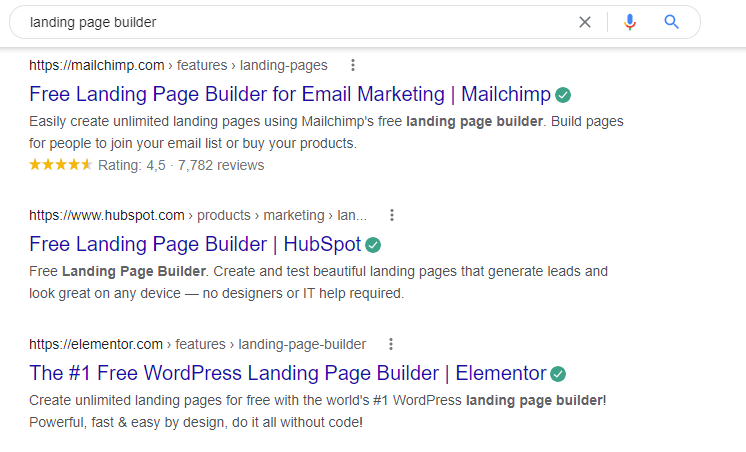
By looking at the SERP for this keyphrase, you’ll notice that all the competing domains are landing page builder tools and that intent is primarily geared towards people looking for software that can assist them in building landing pages.
So unless you’re marketing a tool that can build landing pages, you’d probably want to avoid targeting this specific keyphrase.
However, if you want to create informational blog content comparing the best landing page builders you can target the key phrase “best landing page builders” instead.
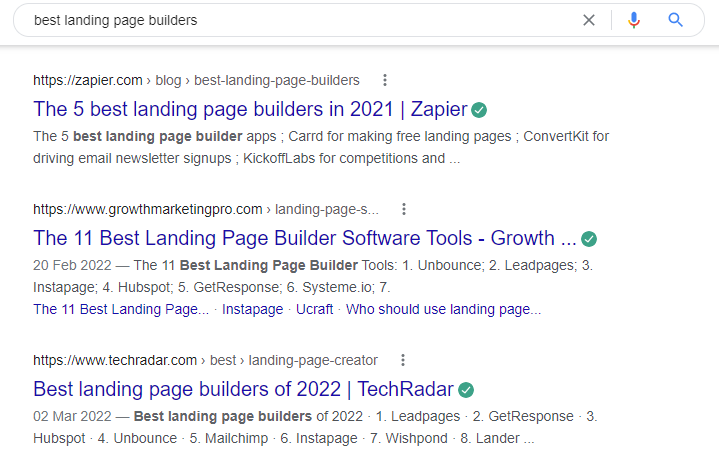
Assists in Generating New Content Ideas
The last reason why keyword research is important for SEO is that it assists in generating new content ideas.
Sometimes it can be challenging to think of new content ideas for your blog. Luckily, most keyword research tools can be used to find new keywords and content ideas.
By plugging in your competitor’s domain, you can find all of the keywords that are currently on their site and which they are currently ranking for.
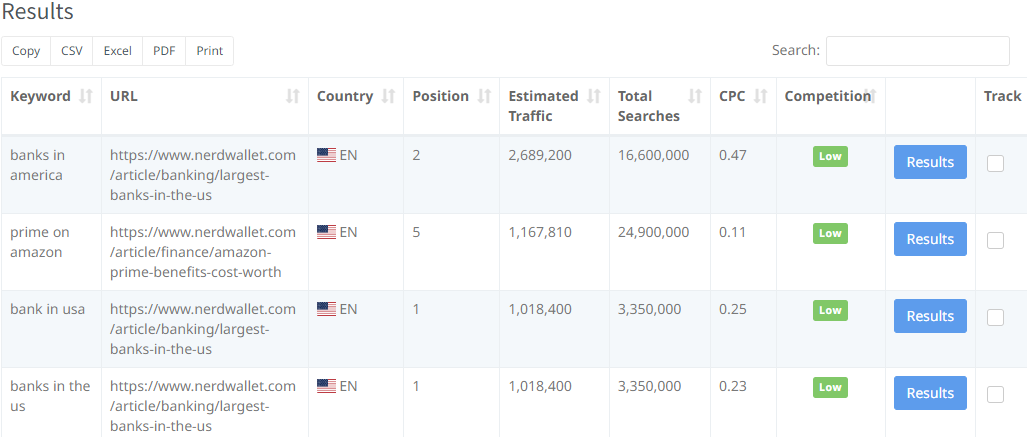
Once you’ve made a list of all of the keywords that you found, you can eliminate the ones with low search volume and high competition.
Types of Keywords
Before we give you some keyword research tips, let’s briefly discuss the 2 main types of keywords, namely long-tail and short-tail keywords.
Long-Tail Keywords
Long-tail keywords can be classified as key phrases consisting of 5 or more words.
An example of a long-tail keyword is “what food is bad for dogs.”

Targeting long-tail keywords is a great way to gradually increase SEO traffic because the level of competition for these keywords is much lower compared to that of short-tail keywords.
Additionally, the conversion rates for these keywords are higher because they are used by searchers who are looking for specific information, products, or services.
Short-Tail Keywords
Short-tail keywords are exactly what their name describes them to be, short. These keywords are usually between one and two words in length.
An example of a short-tail keyword is “dog food”.
If you do some keyword research on this subject, you’ll notice that the competition for this keyword and the search volume is much higher than the long-tail keyword “what food is bad for dogs”.

Because of the high level of competition for this keyword, it will be very difficult to rank for, requiring a lot of time and resources.
Another thing to take note of regarding short-tail keywords is that these terms are usually very broad and not targeted. This means that the conversion rates for these keywords aren’t as high as those of long-tail keywords.
Generally speaking, marketers and content creators should stay away from targeting short-tail keywords, especially if the brand isn’t a large player in the market with an already established reputation.
Keyword Research Tips
Here are a few keyword research tips that you need to consider:
Add Keyword Clusters on One Page
Keyword clusters can be defined as a set of closely related keywords, but that aren’t exactly the same.
An example of a keyword cluster is:
- SEO tools for eCommerce websites
- SEO tools for online stores
- SEO software for online shops
As you can see, these keywords are pretty much similar in definition, but they make use of different wordage.
It wouldn’t be a good idea to create individual pieces of content targeting each of these keywords specifically because that may result in keyword cannibalization.
Instead, content creators should add all of the closely related keywords to one piece of content.
Look at Google Suggest Phrases
Keywords research tools are essential to finding content opportunities, but webmasters shouldn’t neglect using Google Search to unearth keyword gems.
More specifically, Google Suggest can be a great place to find long-tail keywords that are commonly used to find information online.
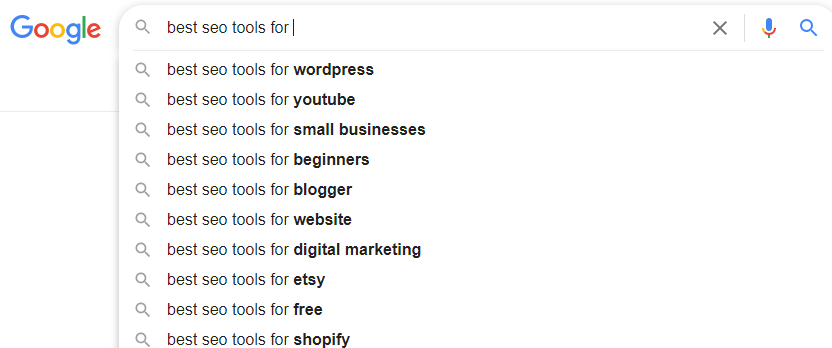
Find Commonly Asked Questions
Google’s “People also ask” section is another part of the SERP that you can look at when doing keyword research.
This section reveals questions asked by Google users.
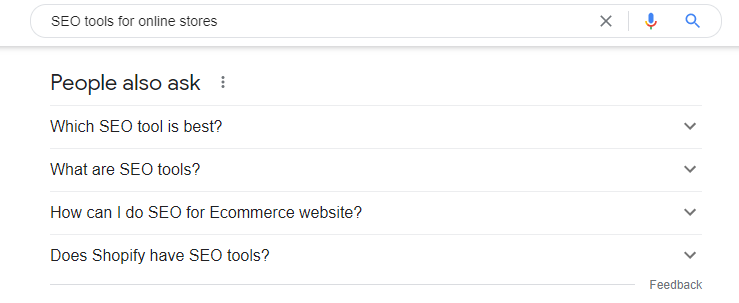
By answering these questions or creating content based on these questions, you can reach people who are looking for answers to these questions.
Conclusion
Keyword research is important for SEO. It reveals a plethora of valuable insights on who your competitors are and what content to create.
The most significant reason why keyword research is important is that it helps you to find what people are searching for online. Because of this, keyword research should be the first step you take when starting a new SEO campaign.




